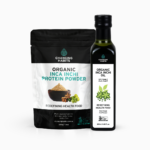The headlines are blaring that fish oil and omega 3 may cause an increase in prostate cancer, it’s the latest research. If you haven’t read the article, have a read here. But then last year I read Vitamin E caused an increase in prostate cancer, then the year before that it was folic acid then a couple of years before that it was Vitamin A. I wonder what other nutrient will increase the chances of prostate cancer over the next decade?
I understand that research such as this can really fill the news feed for many shows around the world but let’s make some sense of this instead of jumping to conclusions.
Firstly the headlines are not that accurate because the researchers were not testing the ingestion of fish and fish oils they were testing the omega 3 values of the blood of each of the subjects in the research. We do not know the diet of the subjects plus we don’t know what type of fish oil or what quality of fish was being consumed. All we know are the measurements of omega 3 fats in the blood that were correlated with an increase in prostate cancer. The value of omega 3 fats found in blood samples were not correlated with the consumption of quality and quantity of fish and fish oil.
Let’s face it, a crappy diet is not made healthy by the addition of fish twice a week (could have been farmed salmon, filled with PCB’s, wrapped in batter and fried in hydrogenated polyunsaturated vegetable oils) and fish oil capsules (yes there are fish oils and there are fish oils).
So we have here scanty knowledge about the health of the subjects as regard to their diet as well as very little knowledge as to the quality of the fish fats which the subjects ate.
I’m not a fish oil capsule fan myself and I do not take them, in actual fact I take nothing in pill or capsule form unless it is a life threatening situation. My nutrients usually come from my food and super foods including beautiful fresh fish caught off the coast of Mooloolaba, I also enjoy some wild salmon and tuna – when I can get it. I do eat a lot of plant based foods with omega 3, such as; Inca Inchi, chia, flax seeds, nuts, seaweed and seeds as well as some land based animal omega 3’s – grass fed beef and butter from grass fed cows.
Every couple of years a particular nutrient is chosen (who by I’m not sure) to become the be all and end all of all health woes. The commercial wheel starts rolling and you find that single nutrient in everything and everywhere. I’ve even found fish oil as an added ingredient in ‘Farmers Own’ Milk.
Fish Oil and Vitamin D are the hits at the moment. Every man, woman and child is buying fish oil and/or vitamin D along with their packaged foods. The unscrupulous part of the supplement industry finds way to cheapen the product by adding dubious and synthetic ingredients, putting small amounts into smaller gel caps, then some research comes out to tell us that perhaps we’ve made a mistake in telling the world to take fish oil capsules. For the last 30 years I’ve seen this scenario happen many times.
Let me tell you a little about the fish oil industry.
Firstly fish oil capsules are so very un environmental. It takes 5kg of fish to make a kg of fish oil. The oceans are running low on stock so fish oil is getting very expensive, as it becomes more expensive other oils such as soy oil (possibly genetically modified) are added to the mix along with other sources of DHA and EPA, not sure how they are being made. This is then packaged into tiny little gel caps that I can tell you have more then just gelatine, I’ve written a whole report on how they make gel caps, capsules and tablets – the mind boggles, You can read this article here.
Just because we know that something is good for us doesn’t mean if we take more it will be better, far from that. While the anti-inflammatory properties of fish oil are documented throughout the literature, extracted fish oil can oxidise causing inflammation, the quality of the fish oil on the market ranges from good to absolutely terrible and price is a good indicator.
To make sure you get your good quality omega 3’s eat a diet from it’s original source and not bound into a capsule. Real fish is a great start. As I mentioned above eat nature based foods that are high in omega 3’s and make your pesto’s, mayonnaises and smoothies with my inca inchi cold pressed oil which is 48% omega 3 and 86% essential fatty acids.
It’s not hard it’s about eating real foods in the most natural way.
Happy Changing Habits,
Cyndi O’Meara








0 Comments